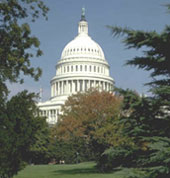
Controversial Patriot Act Reauthorization Ready for Senate Floor
10/14/2009

On Oct. 7, the Senate Judiciary Committee approved a bill, the USA Patriot Act Sunset Extension Act of 2009 (S. 1692), to reauthorize the Patriot Act. The bill, introduced by Sen. Patrick Leahy (D-VT), chair of the committee, passed with bipartisan support but has been denounced by civil liberties groups and privacy advocates. A week earlier, the committee voted down another reauthorization bill, the JUSTICE Act (S. 1686), introduced by Sens. Russ Feingold (D-WI) and Richard Durbin (D-IL), that would have greatly reduced surveillance powers and strengthened civil liberties protections.
Critics of the Leahy bill assert that the legislation does little to address the well known civil liberties concerns and extends sweeping law enforcement surveillance powers with little to no safeguards. For instance, as passed out of committee, the bill renews the roving "John Doe" wiretap authority that allows the federal government to obtain a wiretap order without the requirement to name the target or specify the phone lines and e-mail accounts to be monitored. Further, it offers little or no reform of other controversial Patriot Act provisions
Reform of National Security Letters (NSLs) was also limited in the legislation. NSLs are used by the Justice Department like subpoenas to seek information from companies, such as Internet service providers and phone companies, about their subscribers. The Feingold-Durbin bill had included increased standards for NSL issuance, limitations on the types of information that can be obtained by NSLs, limitations on non-disclosure orders for NSLs, and limits on emergency use of NSLs. The Leahy bill only requires that the government draft an internal statement showing that the information sought is somehow relevant to an investigation. Conversely, the Feingold-Durbin standard would require discussion of specific facts, a much more rigorous standard. However, the committee noted that the Obama administration supports a relevance standard like that found in the Leahy bill.
The Obama administration has been criticized as being an agent against reforming the broad powers granted to the executive branch by the act. According to reports, five of the seven amendments introduced to limit privacy and civil liberties protections were recommended by the Justice Department. Feingold accused the administration of taking positions behind closed doors that it is not taking publicly. In the committee’s public hearing, the Justice Department had stated that it took no position on any of the civil liberties and privacy issues. However, it was reported that they announced their disapproval of some of the bill provisions to the committee during classified meetings.
Some of the provisions to protect civil liberties that the administration opposed, such as the restrictions on NSLs, were proposals that Obama had supported as a senator. In particular, Obama had supported the SAFE Act (S. 737) in 2005 that attempted to reform Section 215 orders that require anyone to produce tangible records relevant to an investigation to protect against international terrorism, including business records. The SAFE Act had been unanimously reported by a Republican-controlled committee and included the requirement of a link between records sought and a terrorist or other agent of a foreign power. Durbin proposed an amendment to the Leahy bill that would have added this standard, but it was voted down due to the administration’s opposition.
Some committee members reacted negatively to the committee vote to accept the Leahy bill for Senate debate. Feingold expressed his disappointment in the final version of the bill. Feingold likened the Senate Judiciary Committee to a "Prosecutor’s Committee" and stated that the bill "falls well short of what the Congress must do to correct the problems with the Patriot Act." This position was echoed by some advocates, including Leslie Harris, president of the Center for Democracy and Technology, who proclaimed that "the opportunity for real reform will not come again anytime soon. Congress needs to do the right thing, even if Obama will not."
Some minor reforms were included the final Leahy bill. The bill included reforms for "sneak and peek" searches and requires the executive branch to issue procedures to minimize the use of NSLs. However, these changes were not enough to garner the support of Feingold or many of the civil liberties groups following the legislation.


